MedEd Learning Experience
The MedEd Learning Experience podcast is a weekly podcast series that provides brief, interview-style discussions with clinical experts and is designed to teach safe and effective use of different therapies in patient monitoring and respiratory interventions. The podcast will feature discussions on anesthesia and brain monitoring, unplanned extubation in the NICU, routine intubation with video laryngoscopy, challenges in the NICU, the value of NIRS in clinical practice in the NICU, non-invasive and invasive ventilation in the NICU, and more. The goal of this program is to get closer to the patient and delve into the challenges and impact of each technology in practice. For more medical education content, please visit: https://www.medtronic.com/covidien/en-us/clinical-education/catalog.html
Episodes
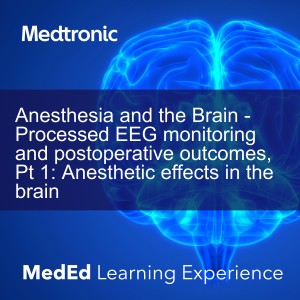
Thursday Mar 31, 2022
Thursday Mar 31, 2022
For this segment of the discussion on anesthesia and the brain, we discuss how anesthesia impacts the brain and why we are concerned about cognitive decline in our patients. To help answer these questions is Dr. TJ Gan, Professor of Anesthesiology and Distinguished Endowed Chair at Stony Brook University.
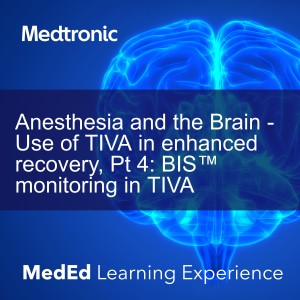
Thursday Mar 31, 2022
Thursday Mar 31, 2022
For this segment of the discussion on anesthesia and the brain, we dive into how BIS™ monitoring in TIVA and how it may help decrease postoperative delirium. To help answer this question is Dr. TJ Gan, Professor of Anesthesiology and Distinguished Endowed Chair at Stony Brook University. Brain monitoring is an adjunctive technology that should not be used as the sole basis for diagnosis or clinical decision-making.
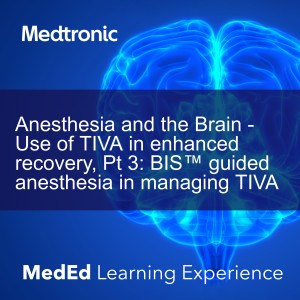
Thursday Mar 31, 2022
Thursday Mar 31, 2022
For this segment of the discussion on anesthesia and the brain, we discuss how BIS™ guided anesthesia be used in managing TIVA. To help answer this question is Dr. TJ Gan, Professor of Anesthesiology and Distinguished Endowed Chair at Stony Brook University.
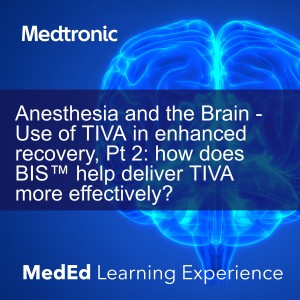
Thursday Mar 31, 2022
Thursday Mar 31, 2022
For this segment of the discussion on anesthesia and the brain, we find out how BIS™ can help the anesthesiology team deliver TIVA more effectively. To help answer this question is Dr. TJ Gan, Professor of Anesthesiology and Distinguished Endowed Chair at Stony Brook University. Brain monitoring is an adjunctive technology that should not be used as the sole basis for diagnosis or clinical decision-making.
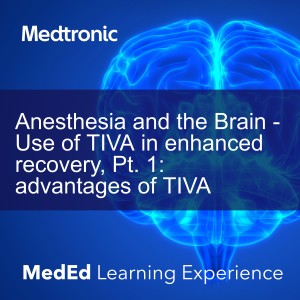
Thursday Mar 31, 2022
Thursday Mar 31, 2022
For this segment of the discussion on anesthesia and the brain, we dive into the advantages of TIVA. To help provide insight into this topic is Dr. TJ Gan, Professor of Anesthesiology and Distinguished Endowed Chair at Stony Brook University.
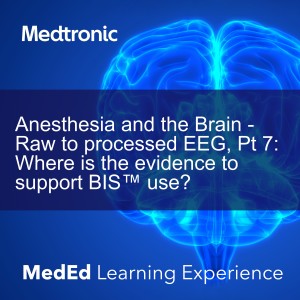
Thursday Mar 31, 2022
Thursday Mar 31, 2022
For this segment of the discussion on anesthesia and the brain, we discuss the evidence to support BIS™ use for brain monitoring. To help provide insight into this topic is Dr. Bob Thiele, Assistant Professor and Co-Director of the Enhanced Recovery After Surgery Program at University of Virginia.
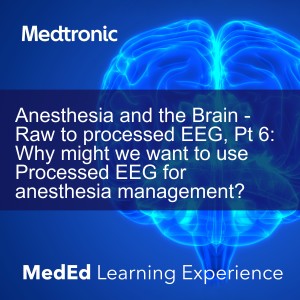
Thursday Mar 31, 2022
Thursday Mar 31, 2022
For this segment of the discussion on anesthesia and the brain, we dive into why we might want to use processed EEG for anesthesia management. To help provide insight into this topic is Dr. Bob Thiele, Assistant Professor and Co-Director of the Enhanced Recovery After Surgery Program at University of Virginia.
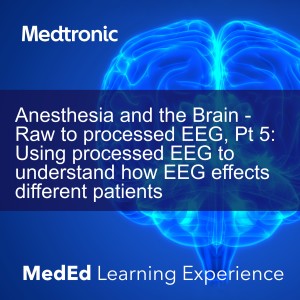
Tuesday Mar 29, 2022
Tuesday Mar 29, 2022
For this segment of the discussion on anesthesia and the brain, we discuss how processed EEG can help understand how EEG effects patients differently. To help provide insight into this topic is Dr. Bob Thiele, Assistant Professor and Co-Director of the Enhanced Recovery After Surgery Program at University of Virginia.
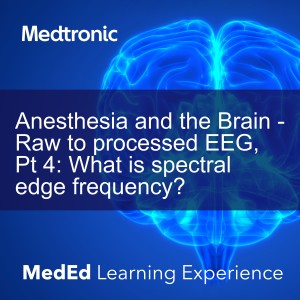
Tuesday Mar 22, 2022
Tuesday Mar 22, 2022
For this segment of the discussion on anesthesia and the brain, we dive into spectral edge frequency. To help provide insight is Dr. Bob Thiele, Assistant Professor and Co-Director Enhanced Recovery After Surgery Program at University of Virginia.
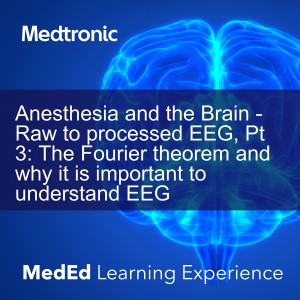
Friday Mar 18, 2022
Friday Mar 18, 2022
For this segment of the discussion on anesthesia and the brain, we discuss the Fourier theorem and how it can help us understand EEG. To help provide insight into this is Dr. Bob Thiele, Assistant Professor and Co-Director of the Enhanced Recovery After Surgery Program at University of Virginia.


